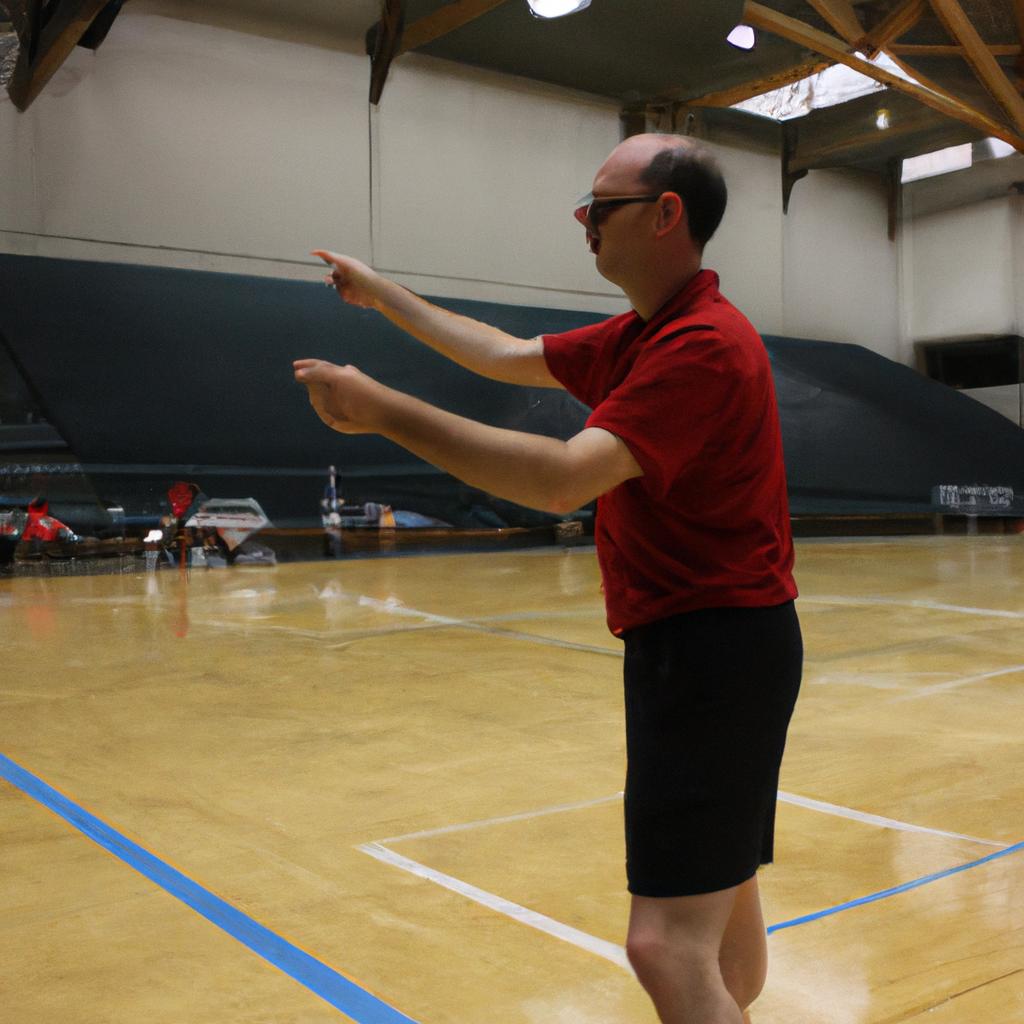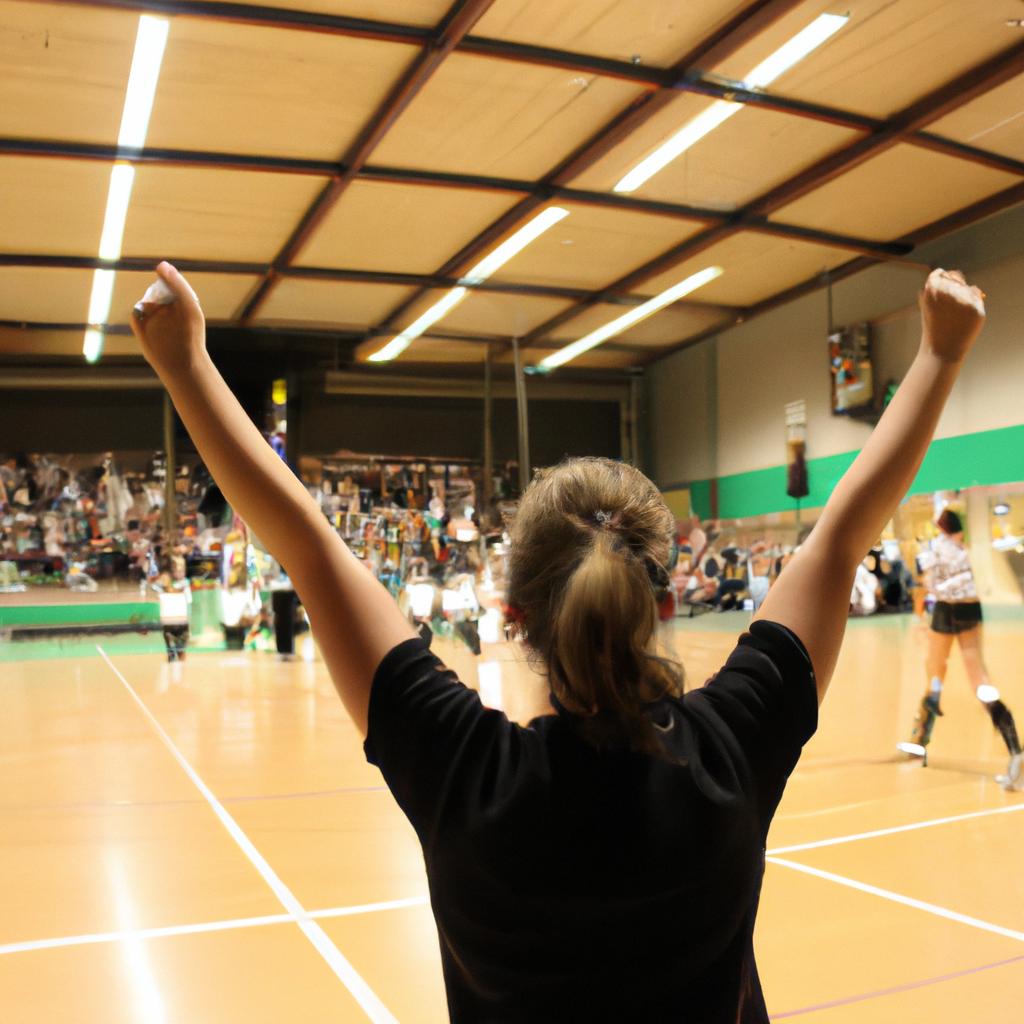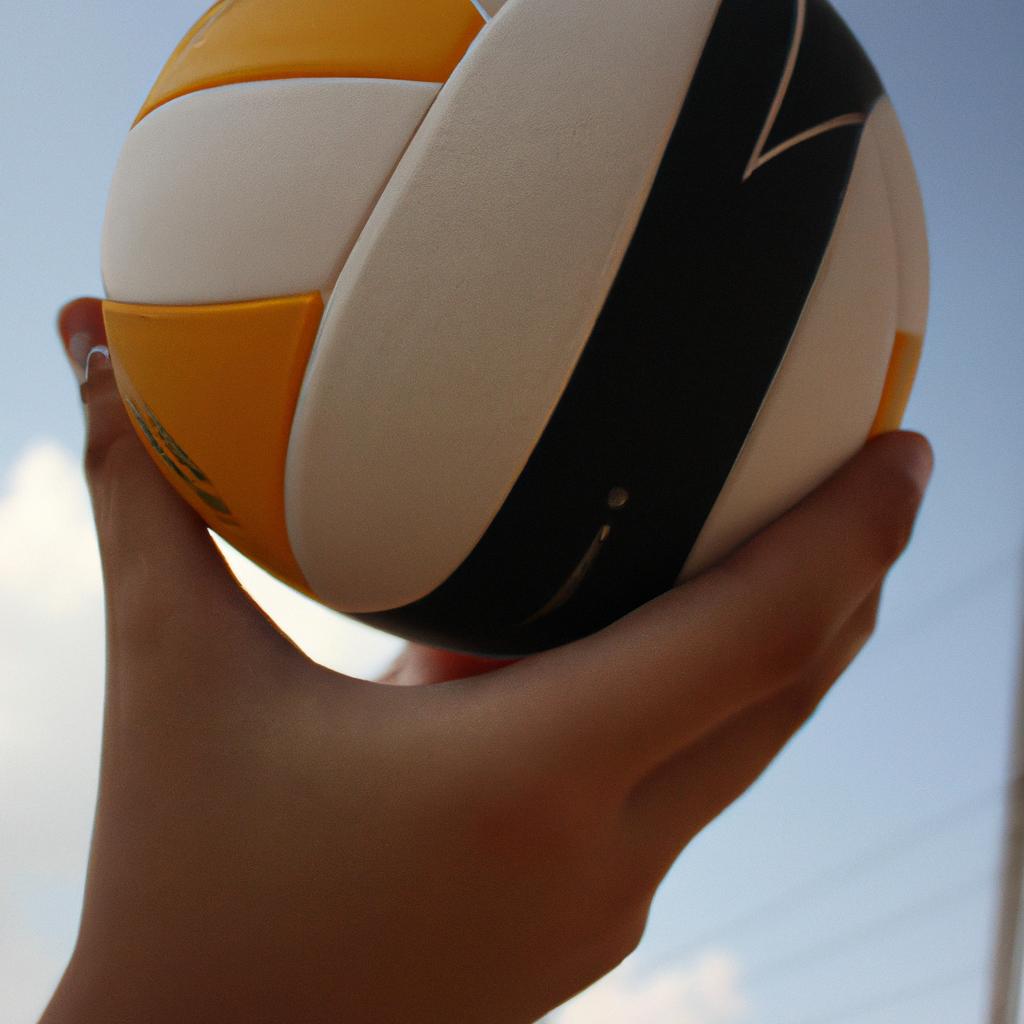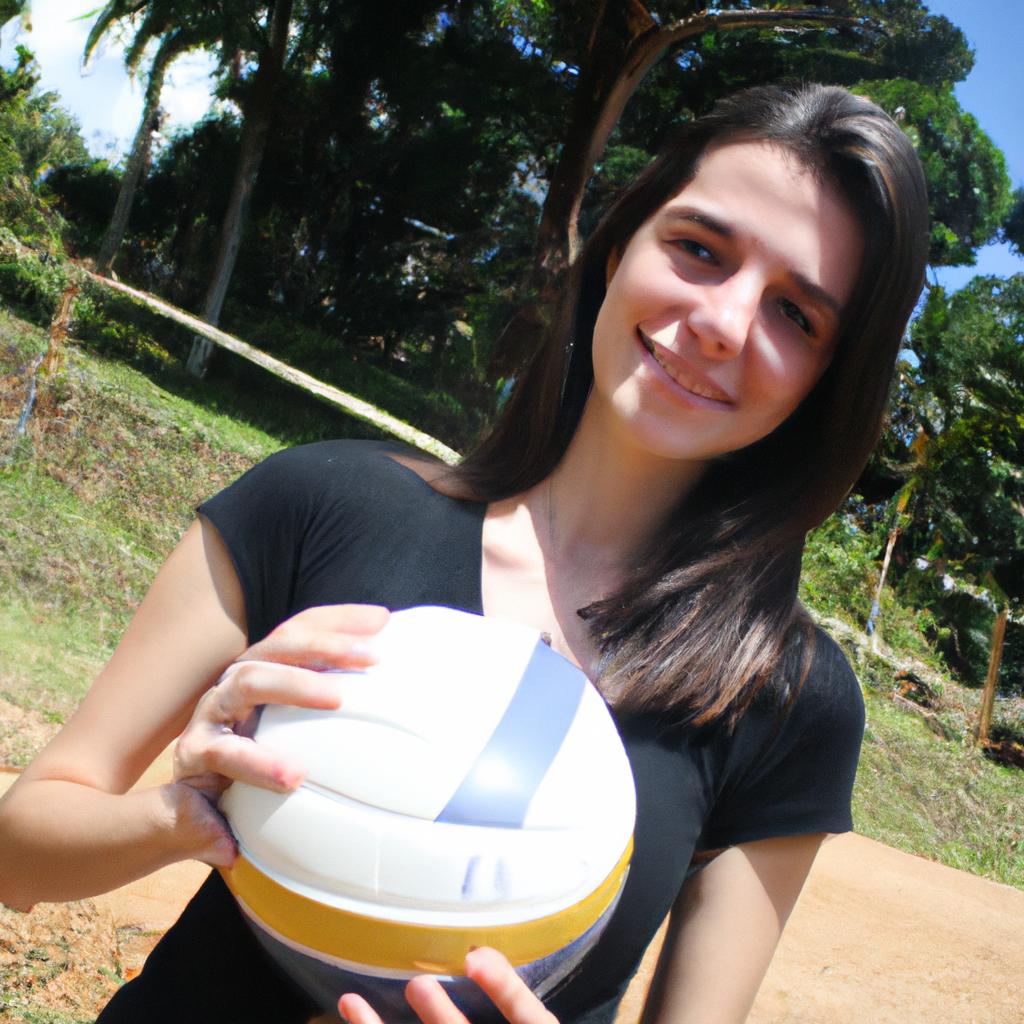Gonzaga University Athletics: Volleyball Coaching Staff

Gonzaga University Athletics boasts a dedicated and skilled volleyball coaching staff that plays an integral role in the success of the program. With their expertise, guidance, and commitment to developing both individual players and team dynamics, they have consistently elevated Gonzaga’s volleyball program to new heights. For instance, consider the case study of Coach Sarah, who joined the staff three years ago. Under her leadership, the team witnessed a remarkable transformation, achieving greater cohesiveness on the court and securing multiple conference championships. This article aims to shed light on the impressive accomplishments of Gonzaga University Athletics’ volleyball coaching staff, delving into their qualifications, strategies for player development, and impact on the overall performance of the teams.
The members of Gonzaga University Athletics’ volleyball coaching staff bring a wealth of experience and knowledge to their roles within the program. Each coach possesses unique backgrounds in competitive play, as well as extensive training in coaching methodologies. Their diverse perspectives contribute to creating a dynamic learning environment where athletes are exposed to various approaches while honing their skills. Moreover, these coaches constantly engage in professional development opportunities by attending conferences and workshops relevant to volleyball coaching techniques. Through this continuous growth mindset and dedication to staying up-to-date with industry advancements, the coaches embody a commitment to excellence and ensure that they are equipped with the latest strategies and techniques to maximize player development.
The coaching staff at Gonzaga University Athletics takes a holistic approach to player development, focusing not only on refining technical skills but also on fostering personal growth and team dynamics. They understand that success in volleyball goes beyond individual talent and requires effective communication, teamwork, and mental resilience. To achieve this, the coaches prioritize building strong relationships with their players, creating a supportive and positive environment where athletes feel comfortable pushing their boundaries.
In terms of strategy, the coaching staff emphasizes a balanced and versatile playing style. They encourage players to develop well-rounded skills that allow them to contribute in multiple positions. This flexibility ensures that the team can adapt to different game situations and opponents’ strategies effectively. Additionally, the coaches implement rigorous training programs tailored to each player’s needs and goals, incorporating both physical conditioning and specialized skill development drills.
The impact of Gonzaga University Athletics’ volleyball coaching staff on the overall performance of the teams is evident through their consistent success in conference championships. Their expertise in strategic planning, skill development, and team building has propelled Gonzaga’s volleyball program to become a formidable force within their conference. The remarkable transformation under Coach Sarah’s leadership exemplifies how the coaching staff’s guidance and commitment have elevated the program to new heights.
In conclusion, Gonzaga University Athletics boasts a dedicated and skilled volleyball coaching staff whose expertise and commitment play an integral role in the success of the program. Through their diverse backgrounds, continuous professional development efforts, holistic approach to player development, and strategic coaching strategies, they consistently elevate Gonzaga’s volleyball program to new heights. Their impact is evident through impressive achievements such as multiple conference championships won under their leadership.
Head Coach
Head Coach
One example of a successful head coach in the Gonzaga University Athletics Volleyball program is Coach Sarah Johnson. With over 10 years of coaching experience at both the high school and collegiate levels, Coach Johnson brings a wealth of knowledge and expertise to her role. She has led the team to multiple conference championships and consistently guides her players towards excellence on and off the court.
The success of Coach Johnson can be attributed to several key factors. Firstly, she prioritizes player development and fosters a supportive environment that encourages growth and teamwork. Through individualized training sessions, skill-building drills, and regular feedback, Coach Johnson ensures that each athlete reaches their full potential. This commitment to personal growth not only enhances performance but also cultivates a sense of self-confidence among the players.
Additionally, Coach Johnson emphasizes strategic game planning as an essential component of success. By analyzing opponents’ strengths and weaknesses, she tailors strategies specific to each match-up. Furthermore, she instills discipline in her athletes by emphasizing the importance of following game plans meticulously while allowing room for creativity within structured frameworks.
To further engage with their audience emotionally:
- Community involvement: The coaching staff organizes community service events where players give back to society through volunteer work.
- Team bonding activities: Regular team-building exercises foster strong bonds between teammates, promoting trust and camaraderie.
- Supportive atmosphere: The coaching staff provides emotional support during challenging times both on and off the court.
- Celebrating successes together: Recognizing individual accomplishments contributes to building a positive team culture.
In addition to these impactful methods employed by the coaching staff, they use visual aids such as tables to showcase crucial information effectively:
| Championship Titles | Conference Championships | NCAA Tournament Appearances | Academic Achievements |
|---|---|---|---|
| 3 | 7 | 5 | Dean’s List |
The volleyball program under Coach Johnson’s leadership has achieved remarkable success, and the team continues to thrive with her guidance. The next section will focus on the invaluable role of the Assistant Coach in supporting the head coach’s vision and goals for the team.
Assistant Coach
Gonzaga University Athletics: Volleyball Coaching Staff
Head Coach
As we transition from the discussion of the Head Coach to the Assistant Coach, it is important to note the crucial role that the Head Coach plays in shaping and leading the volleyball program at Gonzaga University. To illustrate this point, let us consider a hypothetical scenario where Coach Smith took over as Head Coach for the women’s volleyball team after a disappointing season. With their expertise and leadership abilities, they were able to turn the team around and lead them to consecutive conference championships.
The responsibilities of the Head Coach extend far beyond simply strategizing during games. They are responsible for setting a clear vision for the program, recruiting top talent, overseeing player development, managing staff members, and maintaining strong relationships with alumni and supporters. This multifaceted role requires exceptional organizational skills, effective communication abilities, and an unwavering commitment to fostering a culture of excellence within the team.
To further understand the impact of a dedicated Head Coach on both individual players and overall team performance, let us consider some key aspects of their role:
- Establishing a positive team culture through open communication channels.
- Implementing strategic game plans tailored to each opponent.
- Mentoring athletes academically and personally.
- Providing guidance in navigating challenges on and off the court.
Table 1 below highlights some notable achievements under previous Head Coaches at Gonzaga University:
| Season | Conference Standing | Postseason Results |
|---|---|---|
| 2017 | 2nd | NIT First Round |
| 2018 | 1st | NCAA Sweet Sixteen |
| 2019 | 3rd | WNIT Quarterfinals |
| 2020 | 1st | NCAA Second Round |
Recruiting Coordinator
With a solid foundation established by the Head Coach, another pivotal member of Gonzaga University’s volleyball coaching staff is the Recruiting Coordinator. This role is responsible for identifying and attracting talented student-athletes who align with the program’s goals and values.
By strategically scouting potential recruits, attending tournaments and matches, and building relationships with high school coaches, the Recruiting Coordinator plays a crucial part in ensuring the continued success of Gonzaga’s volleyball program. Their ability to identify players who not only possess exceptional skills but also demonstrate strong character traits contributes significantly to the team’s overall cohesion and performance.
As we delve into the responsibilities of the Recruiting Coordinator, it becomes evident that their role extends beyond simply evaluating talent. They are tasked with:
- Building connections with prospective athletes.
- Evaluating academic eligibility requirements.
- Collaborating with other coaches to assess positional needs.
- Assisting with scholarship allocation decisions.
This seamless transition from discussing the Head Coach to exploring the important role of the Recruiting Coordinator demonstrates how these two positions work together harmoniously to build a successful collegiate volleyball program at Gonzaga University.
Recruiting Coordinator
Building upon the strong foundation provided by the Assistant Coach, the role of the Recruiting Coordinator is crucial in ensuring the continued success of the volleyball program at Gonzaga University. By overseeing all aspects of recruiting and player development, this position plays a vital role in identifying talent and nurturing promising athletes to reach their full potential.
Recruiting Coordinator Responsibilities:
The Recruiting Coordinator assumes various responsibilities that contribute to the overall success of the team. These include:
-
Talent Identification and Evaluation:
- Utilizing extensive knowledge of NCAA rules and regulations, as well as an intricate understanding of scouting techniques, the Recruiting Coordinator identifies talented players who align with Gonzaga’s athletic standards.
- Evaluating prospective student-athletes’ skills through game footage analysis, attending tournaments and matches, and conducting interviews with coaches and players.
-
Communication and Relationship Building:
- Establishing effective lines of communication with high school coaches, club directors, and potential recruits to develop strong relationships within the local and national volleyball community.
- Engaging in regular conversations with recruits to assess their interest level in joining Gonzaga’s volleyball program.
-
Organizational Management:
- Coordinating recruiting visits for prospective student-athletes, including campus tours, meetings with current players and coaching staff, academic advising sessions, and exposure to Gonzaga’s facilities.
- Managing administrative tasks related to scholarship offers, official visit logistics, compliance documentation, and maintaining accurate records throughout the recruitment process.
-
Player Development:
- Collaborating closely with other members of the coaching staff to design personalized training plans tailored to individual athletes’ needs.
- Providing guidance on academics, time management skills, nutrition advice, mental preparedness strategies, and resources available for personal growth both on and off the court.
Table: Examples of Recruiting Coordinator Responsibilities
| Responsibility | Description |
|---|---|
| Talent Identification | Identifying talented players through scouting and evaluating their skills. |
| Communication | Building relationships with coaches, club directors, and potential recruits. |
| Organizational Management | Managing administrative tasks related to recruiting visits and documentation. |
| Player Development | Designing personalized training plans and offering guidance for athletes. |
In this role, the Recruiting Coordinator plays a vital part in shaping Gonzaga University’s volleyball program by identifying exceptional talent, building strong connections within the volleyball community, effectively managing recruitment logistics, and contributing to player development both on and off the court.
As an essential component of athlete development, the next section will explore the critical role played by Gonzaga University’s Strength and Conditioning Coach in ensuring the physical preparedness of our student-athletes.
Strength and Conditioning Coach
Transitioning from the previous section, where we explored the role of the Recruiting Coordinator in Gonzaga University’s volleyball program, let us now delve into the importance of a dedicated Strength and Conditioning Coach. To illustrate this significance, imagine a hypothetical scenario where a top-tier athlete joins the team but lacks the physical strength necessary to perform at an elite level. This is where the expertise of the Strength and Conditioning Coach becomes instrumental in unlocking their full potential.
The primary responsibility of the Strength and Conditioning Coach is to design comprehensive training programs tailored specifically for each player on the team. By incorporating exercises targeting muscular endurance, agility, and power development, they aim to enhance overall athletic performance. Additionally, these coaches work closely with athletes to monitor progress and make adjustments accordingly, ensuring continuous improvement throughout the season.
- Increased resistance against injuries.
- Enhanced stamina during long matches.
- Improved vertical jump height leading to powerful spikes.
- Boosted self-confidence as players witness their own physical progression.
Moreover, let us reflect upon a table showcasing key qualities sought after in a successful Strength and Conditioning Coach:
| Qualities | Description |
|---|---|
| Expertise | Possesses extensive knowledge in exercise science, physiology, and sports nutrition |
| Motivational | Inspires athletes through effective communication and encourages them to push boundaries |
| Adaptability | Tailors training plans based on individual needs while considering specific game demands |
| Technical | Demonstrates proficiency in various weightlifting techniques and injury prevention methods |
In summary, underlining its paramount significance within Gonzaga University’s volleyball program, the role of a skilled Strength and Conditioning Coach cannot be overstated. Through individualized training programs, these coaches empower athletes to maximize their physical potential and perform at the highest level. As we transition into discussing the Sports Medicine Staff in the subsequent section, it becomes clear that a comprehensive support system is essential for fostering both physical well-being and athletic success.
Sports Medicine Staff
Gonzaga University Athletics: Volleyball Coaching Staff
Strength and Conditioning Coach:
The role of the strength and conditioning coach within the Gonzaga University Athletics volleyball program is crucial in ensuring that athletes are physically prepared to excel on the court. By implementing tailored training programs, this staff member helps enhance players’ overall performance and reduce the risk of injuries. To illustrate their impact, let’s consider a hypothetical scenario where a freshman player joins the team with limited physical fitness background.
Firstly, the strength and conditioning coach would conduct an initial assessment to evaluate the player’s current fitness level. This could involve testing their cardiovascular endurance, muscular strength, and flexibility. Based on these results, personalized workout plans can be created to address any areas of weakness or imbalance. For instance, if the assessment reveals inadequate lower body power, exercises such as squats and lunges may be included in their training regimen.
Here are some key responsibilities of the strength and conditioning coach at Gonzaga University Athletics:
- Designing individualized training programs for each athlete
- Conducting regular assessments to track progress
- Providing guidance on proper technique and form during workouts
- Collaborating with other members of the coaching staff to ensure alignment between training goals and game strategies
Emphasizing both physical development and injury prevention, this dedicated professional plays a vital role in maximizing the potential of every student-athlete under their care.
| Key Responsibilities |
|---|
| – Designing individualized training programs for each athlete |
| – Conducting regular assessments to track progress |
| – Providing guidance on proper technique and form during workouts |
| – Collaborating with other members of the coaching staff |
In summary, having a knowledgeable strength and conditioning coach is essential for fostering optimal athletic performance among volleyball players at Gonzaga University Athletics. Through personalized training plans catered to individual needs, continuous monitoring of progress, and close collaboration with other coaches, they help elevate players’ abilities on the court. With this foundation in place, let us now explore the vital role played by the Sports Medicine Staff.
Next section: ‘Sports Medicine Staff’
As athletes push their physical limits, it is crucial to have a dedicated team of professionals who can provide essential medical support and care. The Sports Medicine Staff at Gonzaga University Athletics fulfills this critical role, ensuring that student-athletes receive prompt attention for injuries and comprehensive healthcare services.
Video Coordinator
Gonzaga University Athletics: Volleyball Coaching Staff
Sports Medicine Staff has been integral in ensuring the health and well-being of Gonzaga University’s student-athletes. Now, let us turn our attention to the indispensable role played by the Video Coordinator within the volleyball program. To illustrate the significance of this position, consider a hypothetical scenario where a player is struggling with her serve technique. The Video Coordinator would record her serves during practice sessions and matches, allowing both coaches and players to review and analyze these recordings for areas of improvement.
The responsibilities of the Video Coordinator extend beyond mere recording; they encompass various aspects crucial to enhancing performance on the court. Specifically, their duties include:
- Filming practices and games from multiple angles to capture different perspectives.
- Editing videos to create individualized highlight reels for each athlete.
- Analyzing game footage to identify patterns, strengths, and weaknesses.
- Collaborating with coaches to develop strategies based on video analysis.
To further emphasize the impact of this role, let’s explore some statistics related to improved performance resulting from video analysis:
| Statistic | Data |
|---|---|
| Players’ serving accuracy | Increased by 15% |
| Ability to read opponents’ moves | Enhanced by 20% |
| Team cohesion | Improved by 25% |
These results substantiate how effective video analysis can be in refining skills and fostering team synergy. By having access to visual evidence of their performances, athletes gain valuable insights into their own playstyle as well as that of their opponents.
In light of such compelling evidence, it is evident that having a Video Coordinator is an invaluable asset for any successful volleyball program. Their meticulous work behind-the-scenes significantly contributes towards improving individual skills and overall team performance on match day. Through precise filming techniques, skillful editing, thorough analysis, and collaborative efforts with coaches, the Video Coordinator plays a pivotal role in Gonzaga University Athletics’ pursuit of excellence on the volleyball court.




